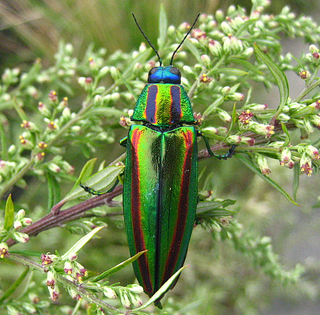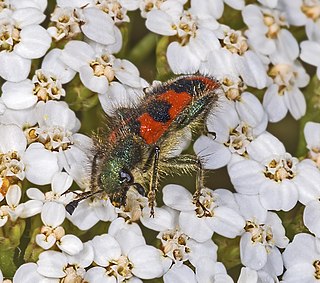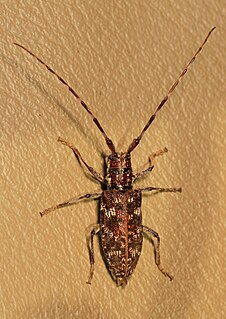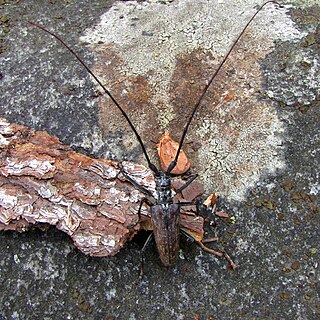
Chrysochroa is a genus of "jewel" or metallic wood-boring beetles, typical of the tribe Chrysochroini. Most of the many species are native to Southeast Asian nations such as Malaysia, Indonesia, and the Philippines. However, a good number are found in India, one in Japan, in Korea, and one in Africa.

Monochamus is a genus of longhorn beetles found throughout the world. They are commonly known as sawyer beetles or sawyers, as their larvae bore into dead or dying trees, especially conifers such as pines. They are the type genus of the Monochamini, a tribe in the huge long-horned beetle subfamily Lamiinae, but typically included in the Lamiini today.

Bursaphelenchus xylophilus, commonly known as pine wood nematode or pine wilt nematode (PWN), is a species of nematode that infects trees in the Pinus genus of coniferous trees and causes the disease pine wilt. While native to North America, it spread in the early 20th century to Japan and in the latter half of the century to other areas of Asia, including China, Taiwan and Korea, as well as to Europe, including Portugal and Spain.
Sawyers is a surname. Notable people with the surname include:

Chrysomela is a genus of leaf beetles found almost throughout the world, but not in Australia. It contains around 40 species, including 7 in eastern and northern Europe. It also includes at least 17 species in North America, including the cottonwood leaf beetle Chrysomela scripta.

Agapanthia is a genus of flat-faced longhorn beetle belonging to the family Cerambycidae, subfamily Lamiinae.

Trichodes is a genus of checkered beetle belonging to the family Cleridae, subfamily Clerinae.

Monochamus scutellatus, commonly known as the white-spotted sawyer or spruce sawyer or spruce bug, is a common wood-boring beetle found throughout North America. It is a species native to North America.

Ceroplesis is a genus of flat-faced longhorn beetle in the subfamily Lamiinae of the family Cerambycidae.

Monochamus alternatus, the Japanese pine sawyer, is a species of beetle in the family Cerambycidae. It was described by Frederick William Hope in 1842. It is known from Hong Kong, Vietnam, Laos, North Korea, South Korea, Japan, China, and Taiwan. It feeds on Pinus banksiana, Abies firma, Pinus armandii, Pinus massoniana, and Pinus densiflora. It serves as a vector for the nematode Bursaphelenchus xylophilus.

Monochamus clamator, the spotted pine sawyer, is a species of beetle in the family Cerambycidae. It was described by John Lawrence LeConte in 1852.

Monochamus galloprovincialis, the pine sawyer beetle, also referred to as the black pine sawyer beetle, is a species of beetle in the family Cerambycidae. It was described by Olivier in 1795, originally under the genus Cerambyx. It has a wide distribution, occurring naturally throughout Europe and the Caucasus. It has also been introduced into the Canary Islands. It serves as a vector for the parasitic nematode species Bursaphelenchus xylophilus, and also acts as a host to the parasitoid wasp species Dolichomitus tuberculatus.

Monochamus impluviatus, the Siberian speckled sawyer, is a species of beetle in the family Cerambycidae. It was described by Victor Motschulsky in 1859. It is recorded from east of the Ural Mountains in Russia through to the Russian Far East, as well as Mongolia, Northeast China and North Korea.

Monochamus maculosus, the spotted pine sawyer, is a species of beetle in the family Cerambycidae. It is known from Canada and the United States, and was formerly known as Monochamus mutator.

Monochamus notatus, the northeastern pine sawyer or notable sawyer, is a species of beetle in the family Cerambycidae. It was described by Dru Drury in 1773, originally under the genus Cerambyx. It is known from Canada and the United States.
Monochamus ruspator is a species of beetle in the family Cerambycidae. It was described by Johan Christian Fabricius in 1781, originally under the genus Lamia. It has a wide distribution throughout Africa.
Monochamus titillator is a species of beetle in the family Cerambycidae. It was described by Johan Christian Fabricius in 1775. It is known from the United States.

Monochamus sartor urussovii is a subspecies of beetle in the family Cerambycidae. It was described by Fischer von Waldheim in 1806. It has been recorded in Eastern and Northern Europe and Northern Asia. It is a vector of the nematode Bursaphelenchus mucronatus. Larvae burrow into the wood of various conifer species and can be a tree pest, as feeding damage reduces the value of the timber.















